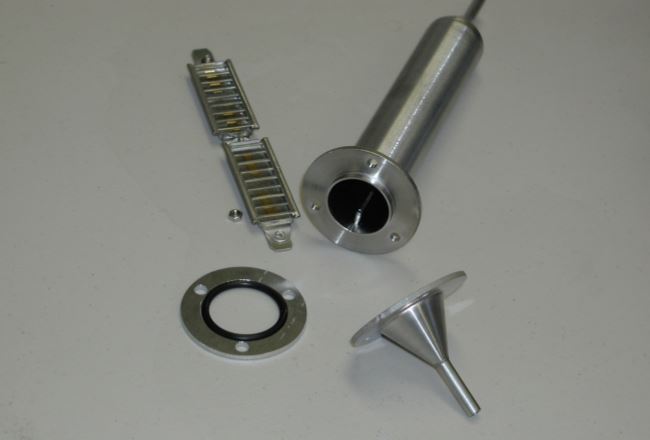
气溶胶中和器的目的是赋予采样的多分散颗粒已知的平衡电荷分布,使得DMA以已知的可重复的方式选择带电粒子作为尺寸的函数。
编辑:Nano004 | 发布日期:2019-05-12
The purpose of the neutralizer is to impart a known, equilibrium charge distribution to the sampled polydisperse particles so that the DMA selects charged particles as a function of size in a known, repeatable manner. The DMA only selects charged particles, so a repeatable and robust technique for charging the incoming particles is critical to proper sizing with the DMA. The neutralizer can also be used to reduce particle losses in aerosol generation systems due to electrostatic precipitation. A photo of the disassembled neutralizer is provided in Figure 5. Under normal conditions, the vast majority of ambient particles carry no charge; some 1–25% carry a single charge with smaller number fractions of particles carrying multiple charges. However, the distribution of particles with one, two or more charges with particle size is not typically known unless they are exposed to ions of sufficient concentration so that a known distribution of charge is imparted to them. In some cases however, for example during electrical storms or when sampling atomized aerosol, a significant fraction of the aerosol can be charged with an unknown distribution of charge as a function of particle size. The charging efficiency of particles is a strong function of particle size, especially for particle diameters smaller than 100 nm. The ion source of the neutralizer consists of two radioactive Polonium-210 strips (0.5 mCi each, Model 2U500, NRD LLC, Grand Island, NY, Tel: 800-525-8076) that emit alpha particle radiation that ionize the air molecules near the strips. The half-life of Po-210 is 138.4 days. The range of the alpha particles in air is 3.8 cm and the radiation is incapable of penetrating the stainless steel body of the neutralizer. In fact, the alpha particles cannot penetrate the layer of dead skin (50 micrometers thick) on the human body. The sources used in the neutralizer do not require special handling precautions beyond those described in the NRD LLC technical literature.
气溶胶中和器的目的是赋予采样的多分散颗粒已知的平衡电荷分布,使得DMA以已知的可重复的方式选择带电粒子作为尺寸的函数。 DMA仅选择带电粒子,因此用于对进入的粒子充电的可重复且稳健的技术对于使用DMA进行适当的尺寸调整是至关重要的。气溶胶中和器还可用于减少由于静电沉淀引起的气溶胶生成系统中的颗粒损失。图5中提供了拆卸气溶胶中和器的照片。在正常条件下,绝大多数环境颗粒不带电荷;约1-25%携带一次充电,较少数量的颗粒带有多个电荷。然而,具有一种,两种或更多种带粒径的电荷的粒子的分布通常是未知的,除非它们暴露于足够浓度的离子,从而赋予它们已知的电荷分布。然而,在某些情况下,例如在电风暴期间或当采样雾化气溶胶时,气溶胶的显着部分可以带有未知的电荷分布作为粒度的函数。颗粒的充电效率是颗粒尺寸的强函数,特别是对于小于100nm的颗粒直径。气溶胶中和器的离子源由两个放射性Pol -210条带(每个0.5 mCi,型号2U500,NRD LLC,Grand Island,NY,电话:800-525-8076)组成,它们发射α粒子辐射,电离附近的空气分子。 Po-210的半衰期为138.4天。空气中α粒子的范围是3.8厘米,并且辐射不能穿透气溶胶中和器的不锈钢体。事实上,α粒子不能穿透人体上的死皮层(50微米厚)。气溶胶中和器中使用的来源不需要超出NRD LLC技术文献中描述的特殊处理预防措施。
| 图片 | 型号 | 品牌 | 产品名称 | 库存 | 价格 | 操作 |
|---|---|---|---|---|---|---|
 | TSI 3012气溶胶中和器 | 美国TSI | TSI 3012气溶胶中和器 | ¥0.00 | 查看详情 | |
 | TSI 3012A气溶胶中和器 | 美国TSI | TSI 3012A气溶胶中和器 | ¥0.00 | 查看详情 | |
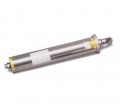 | TSI 3054气溶胶中和器 | 美国TSI | TSI 3054气溶胶中和器 | ¥0.00 | 查看详情 | |
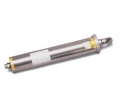 | TSI 3054A气溶胶中和器 | 美国TSI | TSI 3054A气溶胶中和器 | ¥0.00 | 查看详情 | |
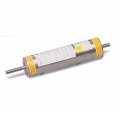 | TSI 3077气溶胶中和器 | 美国TSI | TSI 3077气溶胶中和器 | ¥0.00 | 查看详情 | |
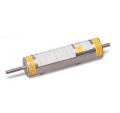 | TSI 3077A气溶胶中和器 | 美国TSI | TSI 3077A气溶胶中和器 | ¥0.00 | 查看详情 | |
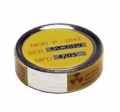 | TSI 348002气溶胶中和器 | 美国TSI | TSI 348002气溶胶中和器 | ¥0.00 | 查看详情 | |
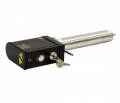 | TSI 3088气溶胶中和器 | 美国TSI | TSI 3088气溶胶中和器 | ¥0.00 | 查看详情 | |
 | 美国TSI 3012/3054/3077气溶胶中和器(Neutralizers) | 美国TSI | 美国TSI 3012/3054/3077气溶胶中和器(Neutralizers) | ¥0.00 | 查看详情 | |
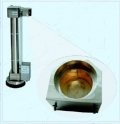 | GRIMM 5.621 电荷中和器 | Grimm | GRIMM 5.621 电荷中和器 | ¥0.00 | 查看详情 | |
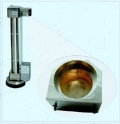 | GRIMM 5.521 电荷中和器 | Grimm | GRIMM 5.521 电荷中和器 | ¥0.00 | 查看详情 | |
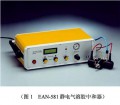 | 德国Topas EAN-581气溶胶静电中和器 | 德国TOPAS | 德国Topas EAN-581气溶胶静电中和器 | ¥0.00 | 查看详情 | |
 | 美国LMS气溶胶中和器 | LMS Technologies, Inc. | 美国LMS气溶胶中和器 | ¥0.00 | 查看详情 | |
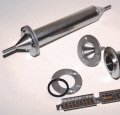 | Brechtel 9000气溶胶静电中和器 | 美国BMI | Brechtel 9000气溶胶静电中和器 | ¥0.00 | 查看详情 | |
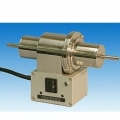 | SMAC 气溶胶静电中和器 | LMS Technologies, Inc. | SOKKEN SMAC-4V2气溶胶静电中和器 | ¥0.00 | 查看详情 |